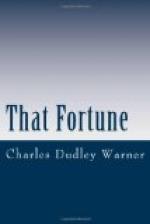Another valuable part of his education was the gracious influence in his aunt’s household, the spirit of candor, of affection, and the sane common-sense with which life was regarded, the simplicity of its faith and the patience with which trials were borne. The lessons he learned in it had more practical influence in his life than all the books he read. Nor were his opportunities for the study of character so meagre as the limit of one family would imply. As often happens in New England households, individualities were very marked, and from his stern uncle and his placid aunt down to the sweet and nimble-witted Alice, the family had developed traits and even eccentricities enough to make it a sort of microcosm of life. There, for instance, was Patience, the maiden aunt, his father’s sister, the news-monger of the fireside, whose powers of ratiocination first gave Philip the Greek idea and method of reasoning to a point and arriving at truth by the process of exclusion. It did not excite his wonder at the time, but afterwards it appeared to him as one of the New England eccentricities of which the novelists make so much. Patience was a home-keeping body and rarely left the premises except to go to church on Sunday, although her cheerfulness and social helpfulness were tinged by nothing morbid. The story was—Philip learned it long afterwards—that in her very young and frisky days Patience had one evening remained out at some merry-making very late, and in fact had been escorted home in the moonlight by a young gentleman when the tall, awful-faced clock, whose face her mother was watching, was on the dreadful stroke of eleven. For this delinquency her mother had reproved her, the girl thought unreasonably, and she had quickly replied, “Mother, I will never go out again.” And she never did. It was in fact a renunciation of the world, made apparently without rage, and adhered to with cheerful obstinacy.
But although for many years Patience rarely left her home, until the habit of seclusion had become as fixed as that of a nun who had taken the vows, no one knew so well as she the news and gossip of the neighborhood, and her power of learning or divining it seemed to increase with her years. She had a habit of sitting, when her household duties permitted, at a front window, which commanded a long view of the river road, and gathering the news by a process peculiar to herself. From this peep-hole she studied the character and destination of all the passers-by that came within range of her vision, and made her comments and deductions, partly to herself, but for the benefit of those who might be listening.
“Why, there goes Thomas Henry,” she would say (she always called people by their first and middle names). “Now, wherever can he be going this morning in the very midst of getting in his hay? He can’t be going to the Browns’ for vegetables, for they set great store by their own raising this year; and they don’t get their provisions up this way either, because Mary Ellen quarreled with Simmons’s people last year. No!” she would exclaim, rising to a climax of certainty on this point, “I’ll be bound he is not going after anything in the eating line!”




